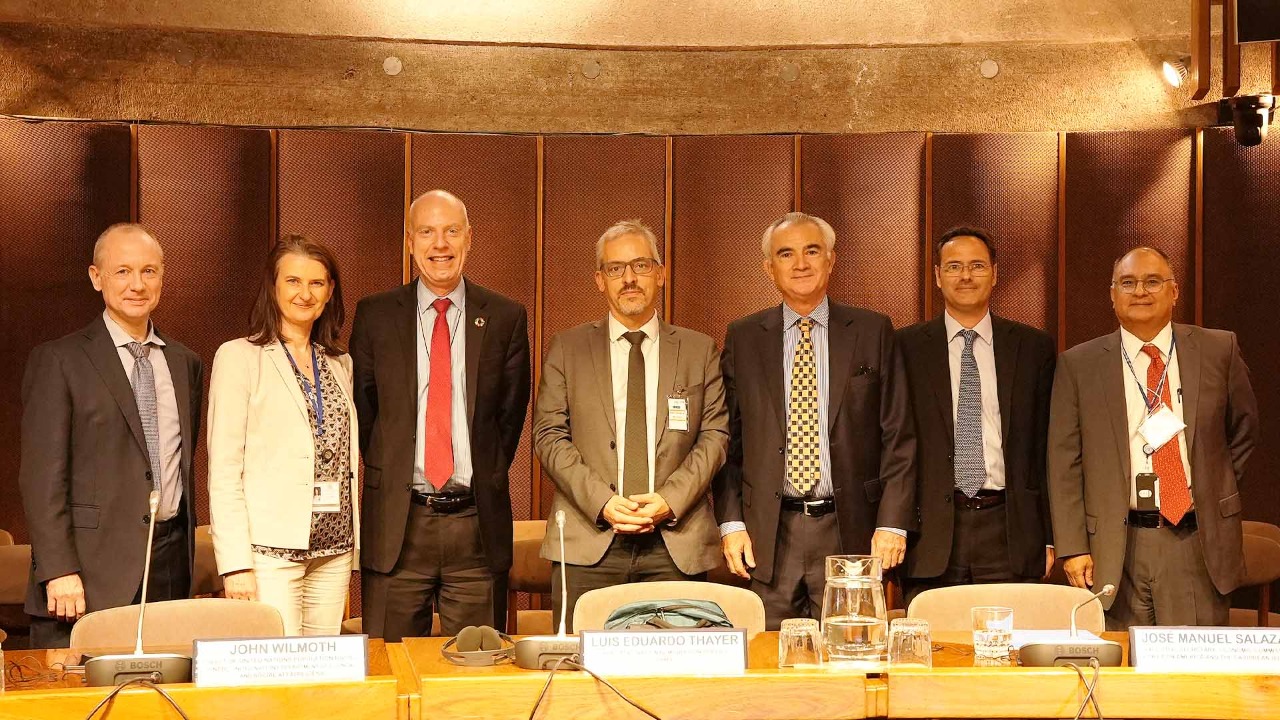ECLAC Calls on Countries to Strengthen the Production, Analysis and Use of Statistics to Address the Causes of Migration with a Development and Human Rights Perspective
Work area(s)
José Manuel Salazar-Xirinachs, the regional commission’s Executive Secretary, participated in the closing session of the Third International Forum on Migration Statistics, which was held at ECLAC’s headquarters in Chile.

The Executive Secretary of the Economic Commission for Latin America and the Caribbean (ECLAC), José Manuel Salazar-Xirinachs, encouraged countries to keep improving statistical information, properly allocating the often scarce resources available, deepening inter-institutional and international cooperation and opening permanent communication channels between data producers, researchers and decision makers in the field of migration governance, at the closing session of the Third International Forum on Migration Statistics, which was held from Tuesday, January 24 to Thursday, January 26 at ECLAC’s headquarters in Santiago, Chile.
The United Nations regional commission’s top representative emphasized that since the beginning of his tenure, in October 2022, he has established that international migration must be one of the ten priority areas for transforming the development model in Latin America and the Caribbean, along with productive transformation; employment and productivity; macroeconomics; the reduction of inequalities; regional integration; social protection; education and skills development; gender equality; climate change and green growth; and digital transformation.
“That is why at ECLAC we have enthusiastically welcomed and supported this Third Forum. We value all the lessons learned from the experts who have shared their knowledge and experience on migration statistics, making very relevant contributions on the challenges of producing evidence on migration and informing us with their visions and innovations,” he said.
The International Forum – organized by the United Nations Department for Economic and Social Affairs (DESA) Statistics and Population Divisions, the Organisation for Economic Co-operation and Development (OECD) and the International Organization for Migration (IOM) – brought together experts to discuss ways to improve the collection, analysis and use of migration data worldwide; to fill existing migration data gaps; and to better inform policy making.
Participating in the event’s closing session were José Manuel Salazar-Xirinachs, Executive Secretary of ECLAC; Luis Eduardo Thayer, Director of the National Migration Service of Chile; John Wilmoth, Director of the United Nations Population Division; Marina Manke, Chief of the Global Migration Data Analysis Centre of the International Organization for Migration (IOM); and Jean-Christophe Dumont, Head of the International Migration Division of the Organisation for Economic Co-operation and Development (OECD).
In his remarks, ECLAC’s Executive Secretary stressed that in order to strengthen the production, analysis and use of migration statistics, it is necessary to bolster national statistical capacities in the areas of population and housing censuses, household surveys and administrative records. In addition, innovative data sources offer a great opportunity to complement traditional migration data sources, he indicated.
José Manuel Salazar-Xirinachs sustained that when designing and implementing public policies that address migration, we must take into account that all too often, migration represents the only option for many people who are lacking opportunities.
“Inequalities within and between countries push a great many people to seek better opportunities for work and well-being in countries that are relatively more developed or that have greater security, institutional stability and access to public goods and services. We must address the root causes of migration based on a development and human rights perspective,” he affirmed.
According to United Nations estimates for the international migrant population, 281 million people were living outside their country of origin in 2020, which represents 3.6% of the global population. This is the highest figure ever recorded, versus the 173 million international migrants accounted for in the year 2000 (2.8% of the global population).
In 2020, Europe had the highest level of intraregional migration in the world, but Latin America and the Caribbean has experienced the greatest relative growth between 2000 and 2020: 72%. Although the United States continues to be the main destination for migrants from Latin America and the Caribbean, several South American countries have attracted many migrants from the region.
“Migrant persons contribute to the well-being, prosperity and development of the region’s communities and countries, whether migrants add to the local labor supply or send remittances to their countries of origin, providing income to meet basic needs. Our studies show that international migrants contribute to the development and GDP growth of destination countries. They also contribute to more diverse, youthful and intercultural societies,” ECLAC’s Executive Secretary underscored.
In his speech, José Manuel Salazar-Xirinachs pointed up the work of the Statistical Conference of the Americas, a subsidiary body of ECLAC, which represents an example of how a regional space for collaboration is necessary and useful for countries to work together and find common solutions to statistical challenges, with the support of the United Nations.
He also highlighted the Comprehensive Development Plan for El Salvador, Guatemala, Honduras and the south-southeast of Mexico, a joint initiative by 20 UN agencies, funds and programs that have operations in Latin America and the Caribbean, coordinated by ECLAC, which is based on four pillars: economic development, social welfare, response to climate change, and comprehensive management of the migration cycle. The Plan emphasizes peace, development, regional integration, multilateralism, international cooperation and respect for the sovereignty of States.
In the framework of the Third International Forum on Migration Statistics, ECLAC’s highest authority held a meeting with António Vitorino, IOM Director General, with whom he addressed the progress and challenges related to implementing the Global Compact for Migration and the importance of continuing to work on the Comprehensive Development Plan for Northern Central America and South-Southeast Mexico.
He also met with Stefano Scarpetta, Director for Employment, Labor and Social Affairs of the OECD, with whom he spoke about deepening collaboration between the two organizations in areas such as the labor market, vocational skills and training, and migration, among others.
The programme of the Third International Forum on Migration Statistics featured six high-level plenary sessions, 24 parallel sessions and a poster exhibition on six priority themes, including follow-up on global agreements, the repercussions of the COVID-19 pandemic and other overlapping crises on migration data, and new data approaches and methodologies.
Related content

Related link(s)
Country(ies)
- Latin America and the Caribbean
Contact
Public Information Unit
- prensa@cepal.org
- (56 2) 2210 2040
